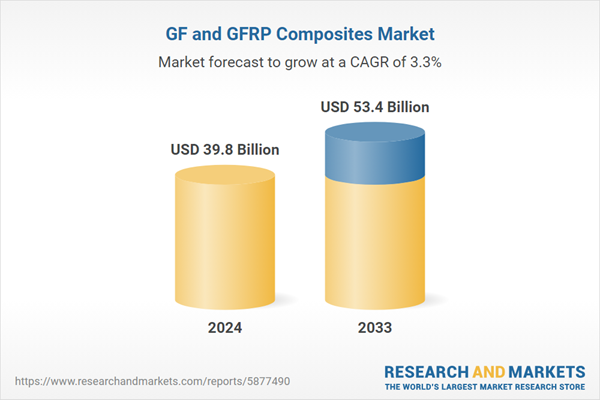Glass fiber (GF) and glass fiber reinforced polymer (GFRP) composites refer to materials made up of glass fibers and a polymer matrix, typically epoxy or polyester. GF composites are made from silica-based materials, such as fiberglass or E-glass. They are strong, lightweight, and have excellent resistance to heat, chemicals, and electrical conductivity. Consequently, they are widely used to manufacture components that require high strength-to-weight ratios, corrosion resistance, electrical insulation, and dimensional stability. On the other hand, GFRP composites emphasize the use of glass fibers as the primary reinforcement within the polymer matrix. They are utilized in the production of structural components like beams, columns, rebars, panels, and pipes. As a result, GF and GFRP find extensive applications across the automotive, aerospace, construction, marine, electrical, and consumer goods industries.
GF and GFRP Composites Market Trends:
The widespread product adoption in the automotive industry across the globe is one of the primary factors propelling the market growth. GF and GFRP composites are widely used in components like body panels, hoods, doors, bumpers, and interior parts to reduce the weight of vehicles while maintaining structural integrity. In line with this, the increasing product demand, owing to its design flexibility as it can be molded into complex shapes, that offers designers and engineers greater flexibility in creating innovative and customized products, which in turn is favoring the market growth. Apart from this, the growing inclination to use bio-based resins and fibers in GF and GFRP composites as a more sustainable alternative to traditional petroleum-based materials owing to rising environmental consciousness is providing an impetus to the market growth. Additionally, the widespread product utilization in the construction industry for the manufacturing of architectural elements, bridges, facades, and lightweight structures is contributing to the market growth. Other factors, including the increasing demand for GF and GFRP composites in electrical and electronic applications, enhanced focus on research and development (R&D) activities, significant growth in the aerospace industry, and rapid innovation to improve the performance, sustainability, and versatility of GF and GFRP composites, are presenting remunerative growth opportunities for the market.Key Market Segmentation:
The publisher provides an analysis of the key trends in each segment of the global GF and GFRP composites market, along with forecasts at the global, regional, and country levels from 2025-2033. Our report has categorized the market based on type and application.Type Insights:
- General-purpose Glass Fibers
- Special-Purpose Glass Fibers
Application Insights:
- Building and Construction
- Electronics
- Transportation
- Others
Regional Insights:
- North America
- United States
- Canada
- Asia Pacific
- China
- Japan
- India
- South Korea
- Australia
- Indonesia
- Others
- Europe
- Germany
- France
- United Kingdom
- Italy
- Spain
- Russia
- Others
- Latin America
- Brazil
- Mexico
- Others
- Middle East and Africa
Competitive Landscape:
The report has also provided a comprehensive analysis of the competitive landscape in the global GF and GFRP composites market. Detailed profiles of all major companies have been provided. Some of the companies covered include 3B - The Fibreglass Company, China Beihai Fiberglass Co. Ltd., China Jushi Co. Ltd, Compagnie de Saint-Gobain S.A, Johns Manville Corporation (Berkshire Hathaway Inc.), Nippon Electric Glass Co. Ltd., Nitto Boseki Co. Ltd., Owens Corning, Taishan Fiberglass Inc (CTG) (Sinoma Science & Technology Co. Ltd.), etc. Kindly note that this only represents a partial list of companies, and the complete list has been provided in the report.Key Questions Answered in This Report:
- How has the global GF and GFRP composites market performed so far, and how will it perform in the coming years?
- What are the drivers, restraints, and opportunities in the global GF and GFRP composites market?
- What is the impact of each driver, restraint, and opportunity on the global GF and GFRP composites market?
- What are the key regional markets?
- Which countries represent the most attractive GF and GFRP composites market?
- What is the breakup of the market based on the type?
- Which is the most attractive type in the GF and GFRP composites market?
- What is the breakup of the market based on the application?
- Which is the most attractive application in the GF and GFRP composites market?
- What is the competitive structure of the global GF and GFRP composites market?
- Who are the key players/companies in the global GF and GFRP composites market?
Table of Contents
Companies Mentioned
- 3B - The Fibreglass Company
- China Beihai Fiberglass Co. Ltd.
- China Jushi Co. Ltd
- Compagnie de Saint-Gobain S.A
- Johns Manville Corporation (Berkshire Hathaway Inc.)
- Nippon Electric Glass Co. Ltd.
- Nitto Boseki Co. Ltd.
- Owens Corning
- Taishan Fiberglass Inc (CTG) (Sinoma Science & Technology Co. Ltd.)
Table Information
| Report Attribute | Details |
|---|---|
| No. of Pages | 145 |
| Published | March 2025 |
| Forecast Period | 2024 - 2033 |
| Estimated Market Value ( USD | $ 39.8 Billion |
| Forecasted Market Value ( USD | $ 53.4 Billion |
| Compound Annual Growth Rate | 3.3% |
| Regions Covered | Global |
| No. of Companies Mentioned | 9 |









